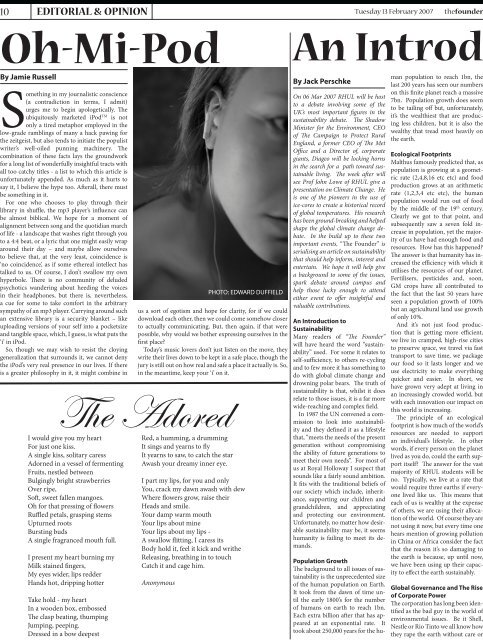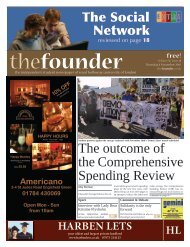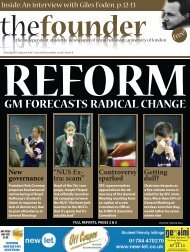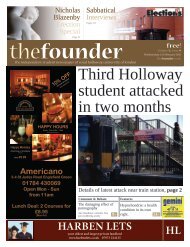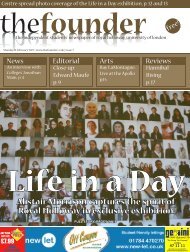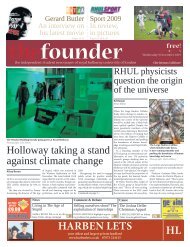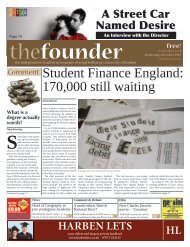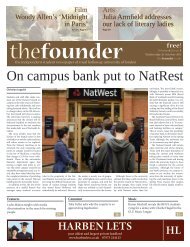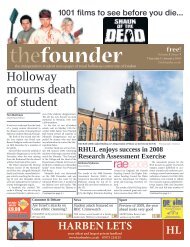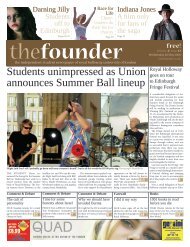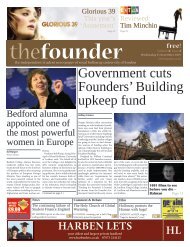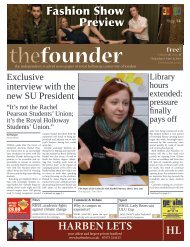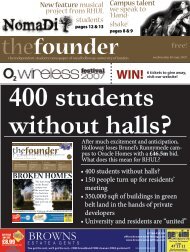Our new President: - The Founder
Our new President: - The Founder
Our new President: - The Founder
Create successful ePaper yourself
Turn your PDF publications into a flip-book with our unique Google optimized e-Paper software.
0 EDITORIAL & OPINION Tuesday 13 February 2007 thefounder<br />
Oh-Mi-Pod<br />
By Jamie Russell<br />
Something in my journalistic conscience<br />
(a contradiction in terms, I admit)<br />
urges me to begin apologetically. <strong>The</strong><br />
ubiquitously marketed iPod TM is not<br />
only a tired metaphor employed in the<br />
low-grade ramblings of many a hack pawing for<br />
the zeitgeist, but also tends to initiate the populist<br />
writer’s well-oiled punning machinery. <strong>The</strong><br />
combination of these facts lays the groundwork<br />
for a long list of wonderfully insightful tracts with<br />
all too catchy titles - a list to which this article is<br />
unfortunately appended. As much as it hurts to<br />
say it, I believe the hype too. Afterall, there must<br />
be something in it.<br />
For one who chooses to play through their<br />
library in shuffle, the mp3 player’s influence can<br />
be almost biblical. We hope for a moment of<br />
alignment between song and the quotidian march<br />
of life - a landscape that washes right through you<br />
to a 4:4 beat, or a lyric that one might easily wrap<br />
around their day – and maybe allow ourselves<br />
to believe that, at the very least, coincidence is<br />
‘no coincidence’, as if some ethereal intellect has<br />
talked to us. Of course, I don’t swallow my own<br />
hyperbole. <strong>The</strong>re is no community of deluded<br />
psychotics wandering about heeding the voices<br />
in their headphones, but there is, nevertheless,<br />
a cue for some to take comfort in the arbitrary<br />
sympathy of an mp3 player. Carrying around such<br />
an extensive library is a security blanket – like<br />
uploading versions of your self into a pocketsize<br />
and tangible space, which, I guess, is what puts the<br />
‘i’ in iPod.<br />
So, though we may wish to resist the cloying<br />
generalization that surrounds it, we cannot deny<br />
the iPod’s very real presence in our lives. If there<br />
is a greater philosophy in it, it might combine in<br />
PHOTO: EDWARD DUFFIELD<br />
us a sort of egotism and hope for clarity, for if we could<br />
download each other, then we could come somehow closer<br />
to actually communicating. But, then again, if that were<br />
possible, why would we bother expressing ourselves in the<br />
first place?<br />
Today’s music lovers don’t just listen on the move, they<br />
write their lives down to be kept in a safe place, though the<br />
jury is still out on how real and safe a place it actually is. So,<br />
in the meantime, keep your ‘i’ on it.<br />
<strong>The</strong> Adored<br />
Red, a humming, a drumming<br />
It sings and yearns to fly<br />
It yearns to saw, to catch the star<br />
Awash your dreamy inner eye.<br />
I would give you my heart<br />
For just one kiss.<br />
A single kiss, solitary caress<br />
Adorned in a vessel of fermenting<br />
Fruits, nestled between<br />
Bulgingly bright strawberries<br />
Over ripe,<br />
Soft, sweet fallen mangoes.<br />
Oh for that pressing of flowers<br />
Ruffled petals, grasping stems<br />
Upturned roots<br />
Bursting buds<br />
A single fragranced mouth full.<br />
I present my heart burning my<br />
Milk stained fingers,<br />
My eyes wider, lips redder<br />
Hands hot, dripping hotter<br />
Take hold - my heart<br />
In a wooden box, embossed<br />
<strong>The</strong> clasp beating, thumping<br />
Jumping, peeping.<br />
Dressed in a bow deepest<br />
I part my lips, for you and only<br />
You, crack my dawn awash with dew<br />
Where flowers grow, raise their<br />
Heads and smile.<br />
Your damp warm mouth<br />
Your lips about mine<br />
Your lips about my lips -<br />
A swallow flitting, I caress its<br />
Body hold it, feel it kick and writhe<br />
Releasing, breathing in to touch<br />
Catch it and cage him.<br />
Anonymous<br />
An Introdu<br />
By Jack Perschke<br />
On 06 Mar 2007 RHUL will be host<br />
to a debate involving some of the<br />
UK’s most important figures in the<br />
sustainability debate. <strong>The</strong> Shadow<br />
Minister for the Environment, CEO<br />
of <strong>The</strong> Campaign to Protect Rural<br />
England, a former CEO of <strong>The</strong> Met<br />
Office and a Director of, corporate<br />
giants, Diageo will be locking horns<br />
in the search for a path toward sustainable<br />
living. <strong>The</strong> week after will<br />
see Prof John Lowe of RHUL give a<br />
presentation on Climate Change. He<br />
is one of the pioneers in the use of<br />
ice-cores to create a historical record<br />
of global temperatures. His research<br />
has been ground-breaking and helped<br />
shape the global climate change debate.<br />
In the build up to these two<br />
important events, “<strong>The</strong> <strong>Founder</strong>” is<br />
serialising an article on sustainability<br />
that should help inform, interest and<br />
entertain. We hope it will help give<br />
a background to some of the issues,<br />
spark debate around campus and<br />
help those lucky enough to attend<br />
either event to offer insightful and<br />
valuable contributions.<br />
An Introduction to<br />
Sustainability<br />
Many readers of “<strong>The</strong> <strong>Founder</strong>”<br />
will have heard the word “sustainability”<br />
used. For some it relates to<br />
self-sufficiency, to others re-cycling<br />
and to few more it has something to<br />
do with global climate change and<br />
drowning polar bears. <strong>The</strong> truth of<br />
sustainability is that, whilst it does<br />
relate to those issues, it is a far more<br />
wide-reaching and complex field.<br />
In 1987 the UN convened a commission<br />
to look into sustainability<br />
and they defined it as a lifestyle<br />
that, “meets the needs of the present<br />
generation without compromising<br />
the ability of future generations to<br />
meet their own needs”. For most of<br />
us at Royal Holloway I suspect that<br />
sounds like a fairly sound ambition.<br />
It fits with the traditional beliefs of<br />
our society which include, inheritance,<br />
supporting our children and<br />
grandchildren, and appreciating<br />
and protecting our environment.<br />
Unfortunately, no matter how desirable<br />
sustainability may be, it seems<br />
humanity is failing to meet its demands.<br />
Population Growth<br />
<strong>The</strong> background to all issues of sustainability<br />
is the unprecedented size<br />
of the human population on Earth.<br />
It took from the dawn of time until<br />
the early 1800’s for the number<br />
of humans on earth to reach 1bn.<br />
Each extra billion after that has appeared<br />
at an exponential rate. It<br />
took about 250,000 years for the human<br />
population to reach 1bn, the<br />
last 200 years has seen our numbers<br />
on this finite planet reach a massive<br />
7bn. Population growth does seem<br />
to be tailing off but, unfortunately,<br />
it’s the wealthiest that are producing<br />
less children, but it is also the<br />
wealthy that tread most heavily on<br />
the earth.<br />
Ecological Footprints<br />
Malthus famously predicted that, as<br />
population is growing at a geometric<br />
rate (2,4,8,16 etc etc) and food<br />
production grows at an arithmetic<br />
rate (1,2,3,4 etc etc), the human<br />
population would run out of food<br />
by the middle of the 19 th century.<br />
Clearly we got to that point, and<br />
subsequently saw a seven fold increase<br />
in population, yet the majority<br />
of us have had enough food and<br />
resources. How has this happened?<br />
<strong>The</strong> answer is that humanity has increased<br />
the efficiency with which it<br />
utilises the resources of our planet.<br />
Fertilisers, pesticides and, soon,<br />
GM crops have all contributed to<br />
the fact that the last 50 years have<br />
seen a population growth of 100%<br />
but an agricultural land use growth<br />
of only 10%.<br />
And it’s not just food production<br />
that is getting more efficient,<br />
we live in cramped, high-rise cities<br />
to preserve space, we travel via fast<br />
transport to save time, we package<br />
our food so it lasts longer and we<br />
use electricity to make everything<br />
quicker and easier. In short, we<br />
have grown very adept at living in<br />
an increasingly crowded world, but<br />
with each innovation our impact on<br />
this world is increasing.<br />
<strong>The</strong> principle of an ecological<br />
footprint is how much of the world’s<br />
resources are needed to support<br />
an individual’s lifestyle. In other<br />
words, if every person on the planet<br />
lived as you do, could the earth support<br />
itself? <strong>The</strong> answer for the vast<br />
majority of RHUL students will be<br />
no. Typically, we live at a rate that<br />
would require three earths if everyone<br />
lived like us. This means that<br />
each of us is wealthy at the expense<br />
of others, we are using their allocation<br />
of the world. Of course they are<br />
not using it now, but every time one<br />
hears mention of growing pollution<br />
in China or Africa consider the fact<br />
that the reason it’s so damaging to<br />
the earth is because, up until now,<br />
we have been using up their capacity<br />
to effect the earth sustainably.<br />
Global Governance and <strong>The</strong> Rise<br />
of Corporate Power<br />
<strong>The</strong> corporation has long been identified<br />
as the bad guy in the world of<br />
environmental issues. Be it Shell,<br />
Nestle or Rio Tinto we all know how<br />
they rape the earth without care or


